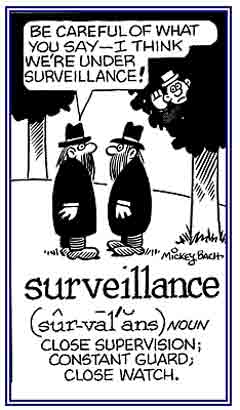super-, supra-, sur-
(Latin: above, over; more than, excessive)
Sur- is a variation of super- developed through the French and shouldn't be confused with another assimilated sur- form that comes from sub- and means: "under, below, beneath".
In some words, super- is amplified to mean: "on top of; higher in rank or position than; superior to; greater in quality, amount, or degree than others of its kind".
2. A tax levied on corporations, or individuals, after net income has exceeded a certain level.
3. Etymology: from French surtaxe; from Old French sur-, "over" + taxe, "tax".
2. A hood with a mantle, worn by women.
3. A term that has been used to refer to all types of coats and cloaks.
2. The act of keeping a careful eye someone or something in order to detect or to prevent any kind of felonious act or to provide evidence of such actions: The surveillances provided by the bank's video cameras helped to identify the bank robbers.
Electronic surveillances are being utilized by more cities around the world in order to apprehend lawbreakers who are involved in illegal activities.
3. Etymology: from French surveillance, "oversight, supervision, a watch"; a noun of action from surveiller, "oversee, watch"; from sur-, "over" + veiller, "to watch" from Latin vigilare, from vigil, "watchful, awake, wakeful".


Go to this Word A Day Revisited Index
so you can see more of Mickey Bach's cartoons.
2. Etymology: from Latin sur, "over" + veiller, "watch" or vigilare, "to keep watch".
2. A comprehensive literary examination, description, or discussion in order to make a judgement about something: The professor was making a survey of the poetry that the students submitted to him which he assigned them to create.
3. Etymology: from Middle English surveien, from Old French surveeir, from Latin supervidere; super-, "over" + videre, "to look, to see".
2. To inspect carefully; to scrutinize: The police were surveying the people who were getting off the train to see if they could see the criminal that they were looking for.
3. To determine the boundaries, area, or elevations of (land or structures on the earth's surface) by means of measuring angles and distances, using the techniques of geometry and trigonometry.
4. Etymology: from Old French surveeir; which came from Middle Latin supervidere, "to oversee"; from Latin super-, "over" + videre, "to see, to look".
2. Someone who conducts a statistical survey.
3. Someone whose occupation is taking accurate measurements of land areas in order to determine boundaries, elevations, and dimensions.
2. A state of surviving or remaining alive.
3. A person or thing that survives, or endures; especially, an ancient custom, observance, belief, or the like.
2. To remain alive or in existence or able to live or function; especially, to succeed in staying alive when faced with a life-threatening danger.
3. Etymology: originally in the legal (inheritance) sense, from Anglo-French survivre; from Old French souvivre; from Latin supervivere. "to live beyond, to live longer than"; from super, "over, beyond" + vivere, "to live".
2. Anyone who lives through afflictions or dangers.
3. Someone who remains alive despite being exposed to a life-threatening danger.
4. A person with great powers of endurance; such as, somebody who shows a great will to live or a great determination to overcome difficulties and to carry on.
5. In law, the one of two or more people having joint interests in property who lives longer than the other, or others, and is, therefore, entitled to the entire property.
Survivorship is particularly applied to those owning real property or other assets; such as, bank accounts or stocks, in "joint tenancy".
Joint tenancy includes the right of survivorship automatically; except that in some states in the United States, joint tenancy of a bank account creates only a presumption of survivorship which might be legally disproved by evidence that the joint tenancy was only for convenience.
Related "above, over, beyond the normal, excessive" word units: epi-; hyper-; ultra-, ult-.
Inter-related cross references, directly or indirectly, involving word units meaning "more, plentiful, fullness, excessive, over flowing": copi-; exuber-; hyper-; multi-; opulen-; ple-; pleio-; plethor-; poly-; total-; ultra-; undu-.


